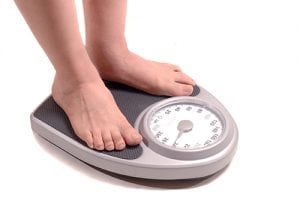
Enjoy health improvements with bypass surgery.
Bypass surgery for the purpose of weight loss is a procedure that makes the stomach smaller by rerouting part of the intestines. As a result, patients feel fuller sooner, absorb fewer calories from the food that is consumed, and lose approximately two-thirds of their excess weight within two years of the procedure.
- In general, patients enjoy significant health improvements
- It is important to remember that individual results do vary
When to Consider Bypass Surgery
Most surgeons who perform bypass surgery adhere to National Institutes of Health (NIH) guidelines to determine if a patient meets the criteria to be considered for the procedure. Generally, patients must have a body mass index (BMI) of 35 or more or be at least 100 pounds over their optimal body weight with a serious condition, such as sleep apnea, heart disease, or type 2 diabetes, that may improve with significant weight loss. Bypass surgery isn’t meant to be the first attempt at weight loss. Patients are often asked to discuss their previous attempts to shed pounds during their initial consultation. This typically includes a physical exam and a medical history review.
Preparing for Bypass Surgery
Prior to the procedure, patients will undergo a thorough exam that usually includes blood tests and ultrasound of the gallbladder to determine if there are any undetected health issues. Patients with existing conditions are typically asked to make an effort to keep those conditions under control as much as possible prior to surgery. Patients who smoke will be asked to quit and certain medications that make clotting difficult will also need to be stopped temporarily. Those who are excessively overweight may be asked to lose some weight on their own prior to surgery to minimize risks. Dietary adjustments usually start prior to surgery so the patient will get used to how they will need to eat following the procedure.
How It Works
 Usually completed in about 4 hours, bypass surgery involves cutting and stapling of the stomach to create a small pouch that can hold about 28 grams (one ounce) of food, a noticeable reduction from the 33 ounces of food the stomach normally holds. The rest of the stomach is attached to the small intestines. Catheters are inserted to keep both portions of the stomach clear. Food will then “bypass” the natural stomach and upper part of the small intestine. The rest of the stomach is attached to bottom of the small intestine. Doing so allows essential digestive juices produced within the stomach to combine with food as it travels through the rest of the intestines to continue and complete the digestive process.
Usually completed in about 4 hours, bypass surgery involves cutting and stapling of the stomach to create a small pouch that can hold about 28 grams (one ounce) of food, a noticeable reduction from the 33 ounces of food the stomach normally holds. The rest of the stomach is attached to the small intestines. Catheters are inserted to keep both portions of the stomach clear. Food will then “bypass” the natural stomach and upper part of the small intestine. The rest of the stomach is attached to bottom of the small intestine. Doing so allows essential digestive juices produced within the stomach to combine with food as it travels through the rest of the intestines to continue and complete the digestive process.
Bypass Surgery Recovery
Most patients recover from bypass surgery within 4-6 weeks after having the procedure. There is some soreness, although medications will be given to control post-surgery discomfort. Patients are usually asked to sit up and walk around about 5-6 hours after the procedure to minimize the risk of clotting and stimulate circulation to facilitate healing. After a post-surgery evaluation, patients are discharged and given instructions on how to proceed when at home. A liquid diet is necessary for the first couple of weeks after surgery since the pouch will still be sensitive at this point and need time to adjust. Following this period, patients transition to solid foods. Light exercise is recommended for the first few months following surgery before transitioning to a regular routine.
Life After Bypass Surgery
 Many patients lose about a third of their excess weight within the first 2-3 months following bypass surgery. However, these results do vary. During the first year are surgery, patients will have follow-up visits evaluate their progress, discuss weight loss results, and determine whether any adjustments may be necessary to their new diet or exercise routine. Most patients are able to develop a new sense of “feeling full,” which will happen with smaller portions. While there is typically a point where a plateau is reached and weight loss slows and levels off or some weight gain is experienced, the overall success rate for the procedure is good. About 60 percent of patients who have weight loss surgery keep the weight off, although results vary. Results can be even more significant for those who adhere to follow-up instructions, make healthy eating choices, and adopt a regular exercise routine.
Many patients lose about a third of their excess weight within the first 2-3 months following bypass surgery. However, these results do vary. During the first year are surgery, patients will have follow-up visits evaluate their progress, discuss weight loss results, and determine whether any adjustments may be necessary to their new diet or exercise routine. Most patients are able to develop a new sense of “feeling full,” which will happen with smaller portions. While there is typically a point where a plateau is reached and weight loss slows and levels off or some weight gain is experienced, the overall success rate for the procedure is good. About 60 percent of patients who have weight loss surgery keep the weight off, although results vary. Results can be even more significant for those who adhere to follow-up instructions, make healthy eating choices, and adopt a regular exercise routine.
Bypass surgery isn’t for everyone. For patients who have struggled with weight issues and have not had reliable results with other weight loss methods, however, it can present an opportunity to improve overall health. It’s a process that will start with an initial consultation and require a commitment to making positive lifestyle changes to improve the odds of enjoying long-term success after the surgery.

